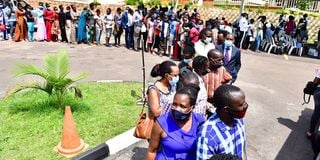Govt to block teachers from class over vaccine

People line up at Ministry of Health offices in Kampala for Covid-19 vaccination yesterday. PHOTO/ ABUBAKER LUBOWA
What you need to know:
The proposal comes after coronavirus hit 29 schools in 17 districts
Top government technocrats yesterday recommended to President Museveni that teachers who have not taken Covid-19 vaccines should be blocked from teaching while children in lower primary classes stay home for longer amid surging pandemic cases.
Highly placed sources last night confirmed the decisions, but Ministry of Health officials only described the 14-point resolutions, which we shared with them for authentication, as “consistent with the thoughts” about reversing the second wave of coronavirus.
Other recommendation included tightening enforcement of curfew and standard operating procedures (SOPs) as well as shifting higher education teaching from in-person to virtual.
Focus of intervention will be on Kampala and Wakiso districts, which account for more than half of the renewed national infections, according to the recommendation to the President who can choose to accept or reject all or some.
Permanent secretaries and Uganda’s health sector development partners reportedly also decided that if Ugandans do not change their ways and continue to ignore SOPs, then the option of imposing localised lockdowns should be considered in about three weeks.
The proposal to block the teachers comes after Coronavirus hit 29 schools in 17 districts and left at least one person dead even as it emerged that some shrewd directors were concealing cases in order to avoid closure
The affected schools include 10 nursing schools, 11 secondary schools, seven primary schools, one Primary Teachers College (PTC) and one tertiary institution.
Although Health ministry officials didn’t disclose the affected schools on account of stigma, Kyambogo University yesterday confirmed eight Covid cases (two lecturers and six students) and immediately suspended face-to-face lectures as a strategic response to the crisis. All lectures and exams will be conducted virtually.
The news about Covid-19 in schools came barely a week before Primary 1, 2 and 3 children return to classes after more than a year at home. The surge is likely to affect the revised school calendar.
The temporary Covid taskforce convened a crisis meeting yesterday to discuss the surge and the way forward.
The meeting was still on-going at press time even as officials in the health ministry talked of a second lockdown.
Dr Henry Mwebesa, the director general health services at Ministry of Health, told reporters in Kampala that the government had on May 18 noted a sharp rise in the number of cases in schools which he attributed to overcrowding, non-adherence to SOPs and inadequate supervision.
“Schools were also having a mixed picture. Some schools were not keen at reporting because they think if they report and we investigate, we shall close them. That’s not really our objective, our objective is to go and investigate and help them isolate those who are sick, treat them,” Dr Mwebesa said.
He added: “The picture we are seeing is that the teachers, administrators tend to hide the situation until some parents report or some students send us WhatsApp messages.”
The Kyambogo University Vice Chancellor, Prof Eli Katunguka, told Daily Monitor that in addition to the confirmed cases, many students have cough and flu and yet many have refused to get tested, warning the situation could worsen. It is alleged that following the suspension of physical learning, a number of students from the institution mobilised a strike, saying online classes are very expensive.
Government has appealed to school administrators to step up vigilance and enforcement of SOPs.
As of yesterday, Uganda had registered at least 44,594 covid-19 cases with 43,401 recoveries and 361 deaths.
A total of 194 cases are admitted to different health facilities across the country. Unlike during the first wave, the most affected people during this second wave are aged between 20 and 39 years.
“In the first wave, it took us three to four months to get to the full blown pandemic while in the second wave, it has taken us less than 10 days. The increase in the number of cases coupled with deaths is largely due to complacency in adhering to the Covid-19 public health prevention measures,” Dr Mwebesa said.
As per Ministry of Health data between April 1 to May 22, 26 per cent of Covid cases were registered among those aged between 20 and 29 years, 25 per cent of cases among those aged between 30 and 39 years, 17 per cent among those aged 40 to 49 years among others.
As on May 22, Mulago Hospital had three patients aged between 10 and 20 years, six patients aged between 21 and 30 years, nine patients aged between 31 and 40 years, among others.
Recommendations
According to sources, the National Covid-19 taskforce meeting recommended the following.
1. Curfew enforcement to be more strict.
2. SOPs should be fully implemented and enforced immediately
3. Burials, churches, mosques, social gatherings are to be scientific going forward.
4. Increased enforcement
5. Online classes at higher levels should be emphasised
6. The President to make the final statement in due course
7. Lockdown may come for 3 weeks
8. Public transport might be stopped
9. Cargo transport for cargo only
10. Strengthen vaccination drive
11. Focus is going to be on high risk districts, including among others Kampala, Wakiso etc.
12. Learners who haven’t started (P1-P3) to wait a little longer.
13. Children in boarding schools to remain in schools and monitored closely.
14. Teachers not vaccinated not to be allowed to teach.




